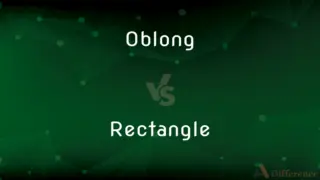Rules vs. Policies — What's the Difference?
Edited by Tayyaba Rehman — By Fiza Rafique — Published on December 20, 2023
Rules are specific mandates dictating what is allowed, while Policies are overarching guidelines shaping decisions and actions.

Difference Between Rules and Policies
Table of Contents
ADVERTISEMENT
Key Differences
Rules typically provide explicit instructions that must be followed, ensuring uniformity. In contrast, Policies offer broad directives that set a general course without detailing every step.
In an organizational context, Rules might determine daily operations or behaviors, requiring strict adherence. On the other hand, Policies establish the framework, guiding decisions without being overly prescriptive.
Rules often have clear consequences if breached, making expectations transparent. Policies, while essential, might allow for some flexibility in their interpretation and application.
In essence, Rules can be considered the "dos and don'ts," laying out permissible actions. Conversely, Policies act as guiding philosophies, indicating an organization's stance on various matters.
Comparison Chart
Nature
Specific and prescriptive
Broad and guiding
ADVERTISEMENT
Flexibility
Generally rigid
May allow some interpretation
Application
Direct actions
Influence decisions
Consequences of Breach
Often clearly defined
Might be less explicitly stated
Scope
Narrow, addressing specific actions
Wider, addressing overarching principles or stances
Compare with Definitions
Rules
Prescriptions determining dos and don'ts.
According to the game's rules, players must take turns.
Policies
Overarching principles indicating stance.
The school's anti-bullying policies reflect its commitment to safety.
Rules
Set standards for allowed actions.
Company rules mandate wearing uniforms.
Policies
Broad guidelines directing organizational decisions.
The company's policies emphasize employee well-being.
Rules
Definite protocols setting boundaries.
Parking rules indicate where vehicles can be stationed.
Policies
General frameworks shaping actions.
Environmental policies guide the factory's waste disposal methods.
Rules
Explicit directives for behavior.
The school's rules prohibit running in the hallway.
Policies
Directives offering direction without detailing every step.
Health policies promote regular check-ups for employees.
Rules
Governing power or its possession or use; authority.
Policies
Guidelines indicating preferred courses of action.
Return policies outline procedures for product exchanges.
Rules
The duration of such power.
Policies
A plan or course of action, as of a government, political party, or business, intended to influence and determine decisions, actions, and other matters
American foreign policy.
The company's personnel policy.
Rules
An authoritative, prescribed direction for conduct, especially one of the regulations governing procedure in a legislative body or a regulation observed by the players in a game, sport, or contest.
Policies
A course of action, guiding principle, or procedure considered expedient, prudent, or advantageous
Honesty is the best policy.
Rules
The body of regulations prescribed by the founder of a religious order for governing the conduct of its members.
Policies
Prudence, shrewdness, or sagacity in practical matters
It is never good policy to speak rashly.
Rules
A usual, customary, or generalized course of action or behavior
"The rule of life in the defense bar ordinarily is to go along and get along" (Scott Turow).
Policies
A written contract or certificate of insurance.
Rules
A generalized statement that describes what is true in most or all cases
In this office, hard work is the rule, not the exception.
Policies
A numbers game.
Rules
(Mathematics) A standard method or procedure for solving a class of problems.
Policies
Plural of policy
Rules
A court decision serving as a precedent for subsequent cases
The Miranda rule.
Rules
A legal doctrine or principle.
Rules
A court order.
Rules
A minor regulation or law.
Rules
A statute or regulation governing the court process
Rule of procedure.
Rule of evidence.
Rules
See ruler.
Rules
(Printing) A thin metal strip of various widths and designs, used to print borders or lines, as between columns.
Rules
To exercise control, dominion, or direction over; govern
Rule a kingdom.
Rules
To have a powerful influence over; dominate
"Many found the lanky westerner naive, and supposed that he would be ruled by one of his more commanding cabinet officers" (William Marvel).
Rules
To be a preeminent or dominant factor in
"It was a place where ... middle-class life was ruled by a hankering for all things foreign" (Amitav Ghosh).
Rules
To decide or declare authoritatively or judicially; decree
The judges ruled that the answer was acceptable. The police ruled the death a homicide. The law was ruled unconstitutional.
Rules
To mark with straight parallel lines.
Rules
To mark (a straight line), as with a ruler.
Rules
To be in total control or command; exercise supreme authority.
Rules
To formulate and issue a decree or decision.
Rules
To prevail at a particular level or rate
Prices ruled low.
Rules
(Slang) To be excellent or superior
That new video game rules!.
Rules
Plural of rule
Rules
Binding instructions requiring adherence.
The rules of the contest are non-negotiable.
Common Curiosities
Do Rules and Policies serve different purposes?
Yes, rules provide exact mandates, while policies give a broader framework for decision-making.
Are Rules typically more specific than Policies?
Yes, rules are more specific, dictating exact actions, while policies provide general guidelines.
Can Rules be based on organizational Policies?
Yes, policies can guide the creation of specific rules to ensure adherence.
Are Rules generally more rigid than Policies?
Typically, yes. Rules dictate specific actions, while policies might allow some interpretation.
Can an organization have Policies without specific Rules?
Yes, an organization might have broad policies without detailing specific rules for every situation.
Are breaches of Rules and Policies always met with consequences?
Breaches of rules usually have defined consequences, while breaches of policies might be addressed more flexibly.
Can Policies change based on evolving perspectives or situations?
Yes, policies can be updated to reflect new priorities or understandings.
Are Policies exclusive to organizations or companies?
No, policies can exist in various contexts, from governmental entities to community groups.
Which typically comes first in an organization: Rules or Policies?
Policies usually come first, providing a general direction, followed by specific rules.
Is it essential to have both Rules and Policies?
It depends on the context. Some settings require both for clarity and direction, while others might only need one.
Share Your Discovery

Previous Comparison
Like vs. Such As
Next Comparison
Lymphatic System vs. Immune SystemAuthor Spotlight
Written by
Fiza RafiqueFiza Rafique is a skilled content writer at AskDifference.com, where she meticulously refines and enhances written pieces. Drawing from her vast editorial expertise, Fiza ensures clarity, accuracy, and precision in every article. Passionate about language, she continually seeks to elevate the quality of content for readers worldwide.
Edited by
Tayyaba RehmanTayyaba Rehman is a distinguished writer, currently serving as a primary contributor to askdifference.com. As a researcher in semantics and etymology, Tayyaba's passion for the complexity of languages and their distinctions has found a perfect home on the platform. Tayyaba delves into the intricacies of language, distinguishing between commonly confused words and phrases, thereby providing clarity for readers worldwide.













































